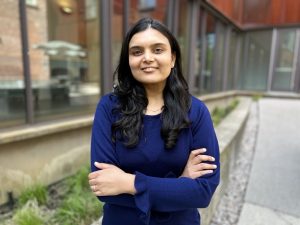
Anubha Agarwal vividly remembers when her high school teacher explained how economics is a social science. Knowing the field is quantitative and measures the causes and effects of human actions, and their social implications through economic activities, excited Anubha.
“I developed a very keen interest in economics from my first class. I’ve never looked back. I knew very early on that I wanted to specialize in economics,” she said.
Anubha completed her bachelor’s and master’s degrees in economics in India and plucked up the courage to move halfway across the world to start her PhD at the University of Toronto in 2019.
“Anubha is an exceptional graduate student who approaches challenges with determination and perseverance, always striving to expand her knowledge and skills,” said Professor Diego Restuccia, Anubha Agarwal’s thesis committee co-supervisor. “She is one of the nicest and kindest students I have interacted with, always willing to collaborate and support her peers.”
Adriano Macedo: When did you decide to pursue a PhD in economics?
Anubha Agarwal: I was always interested in doing a PhD even when I was in my master’s, but I wasn’t fully sure about it. It’s a pretty big commitment in terms of time and effort, so I decided to work for a year or two before I was fully and mentally ready to take up the challenge.
AM: What are you working on now?
AA: My research field is macroeconomics. More specifically, I work on topics related to firm dynamics, market power and innovation. I’m currently working on understanding the sources and implications of firms’ geographic expansion. I’ve been very lucky to have a very supportive committee. Professor Diego Restuccia and Professor Murat Celik are my co-advisors, and Professor Gueorgui Kambourov is on my committee too. They’re all very helpful and insightful.
AM: Do you like Toronto?
AA: I love Toronto. I love the fact that it’s so diverse, so many cultures, a lot of different cuisines. I’m a foodie, I love to cook, so I’m always excited about trying different cuisines. So that’s very exciting.
AM: What is a book that made an impact on your life?
AA: I read The Kite Runner and A Thousand Splendid Suns by Khalid Hussaini when I was a teenager. I think the subject of the books and the characters displayed were influential in terms of the way I thought about life.
AM: Is there a movie that has inspired you in your life?
AA: There’s a Hindi movie that I really like. It’s called Chak De! India. It’s a sports movie about a team of girls who play field hockey, the national sport of India. And the movie is about how there’s a team of girls coming from different states of India who were selected for the national team, but they don’t really know what a team is. The coach, who is kind of the hero in the movie, is played by the famous actor Shah Rukh Khan. He motivates them to play together as a team. It was a movie that showed me how one person’s actions could impact the greater good, how you could, as an individual, influence people around you, make them believe in themselves, in the power of being with each other and doing something greater for the country or for the world. That movie left a deep imprint on me, and I often go back to it when I’m feeling low.
AM: What do you consider your main virtue?
AA: I believe my main virtue is honesty and being straightforward with people. I believe that the harder way to care for somebody is to show them the truth, even if it means being candid with them.
AM: What do you most value in your friends?
AA: I value honesty and kindness, I tend to make friends with people who are kind individuals and not just with me, but with everybody because that shows a certain character.
AM: What is your idea of happiness?
AA: My idea of happiness is a well-balanced life in terms of finding a career that you enjoy doing and working really hard. But at the same time, having some empathy for other people, having some quality time to spend with your family and friends. And having the time to take care of your own health and your own mental and physical health. If I’m able to do that in the years to come, I will be very happy.
AM: What makes you happy?
AA: Small things make me happy, things like watching a movie that can uplift my mood, having a good meal cooked by myself or cooked by somebody around me can really make me happy. Having a good, cold coffee or watching some nice scenery. It could be like very pretty mountains, the snow or just a beautiful beach.
AM: How do you keep a balanced state of mind?
AA: I definitely try to find time to do some physical exercise regularly. It’s very important to have a very balanced lifestyle which includes, firstly, eating well. I put a lot of energy into deciding how I eat what I eat. Eating fresh food like fruits then green vegetables, nuts. The second is being mindful of your physical and mental health. I regularly take breaks to go for walks, to go for runs, go to the gym, do yoga, and go dancing.
AM: What is your motto?
AA: I don’t think I have a motto, but one thing that I’ve really abided by is there’s no substitute for hard work. If you want to achieve something, I think consistency and perseverance are very important.
Return to the Department of Economics website.
Scroll more news.
